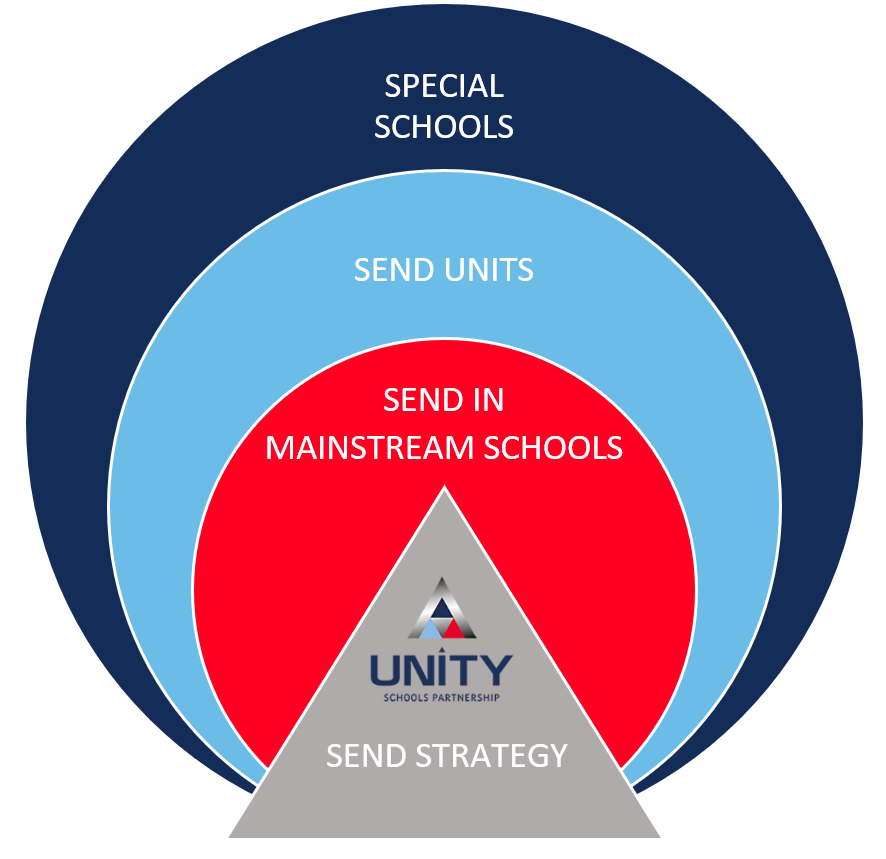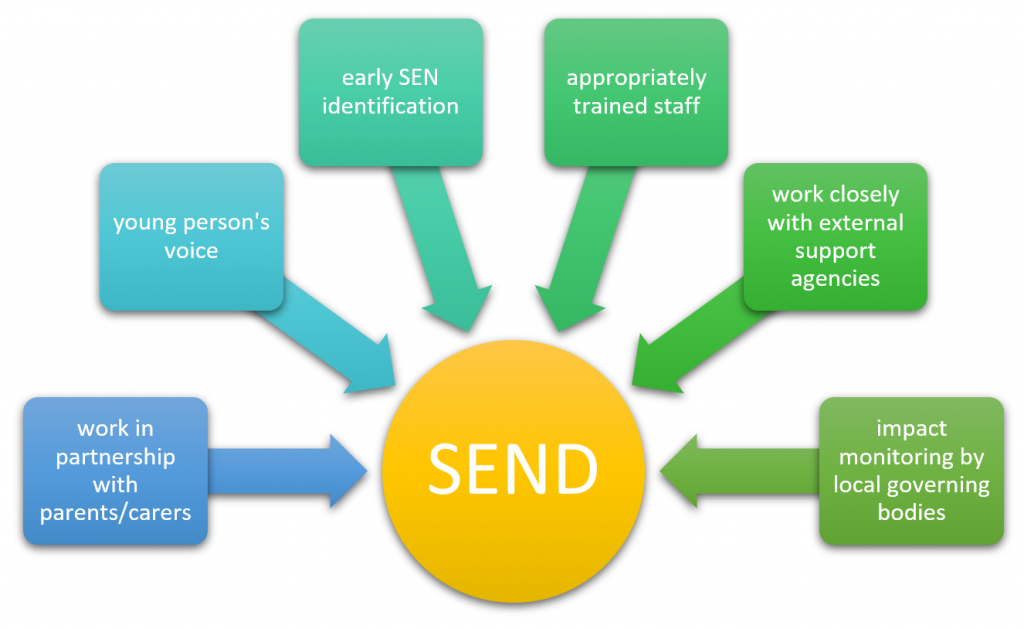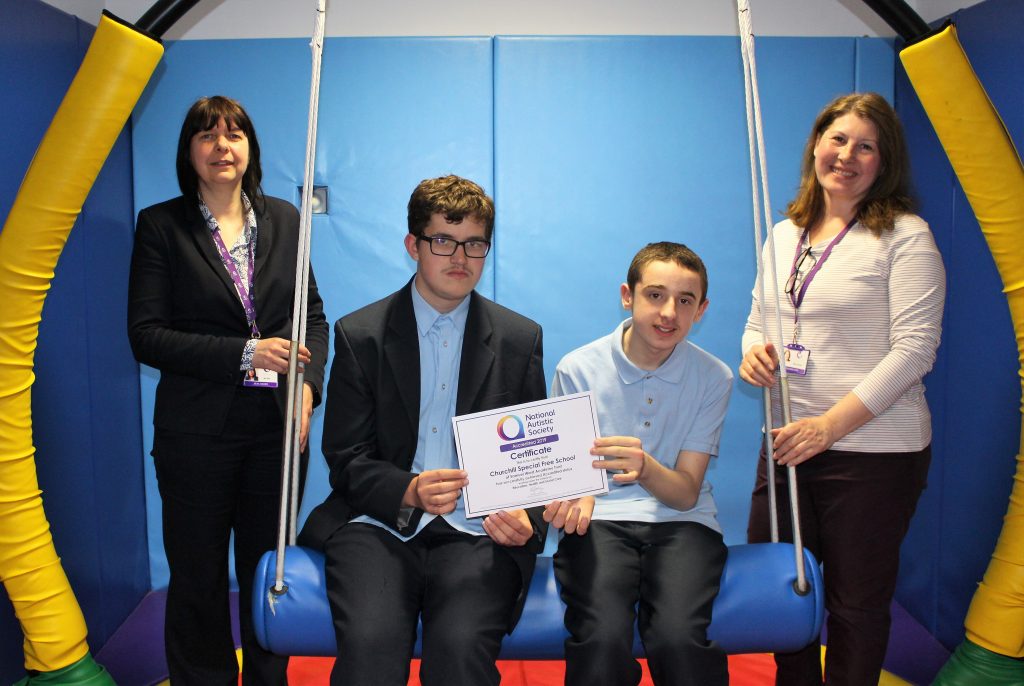SEND VISION
Unity Schools Partnership academies strive to ensure that all pupils leave their settings as confident, resilient individuals, positive about their future and equipped to deal with challenges – having a learning difficulty or disability is not seen as a barrier to achievement.
We believe that all pupils can make good progress, whatever their starting point. We encourage pupils to strive constantly to gain independent learning skills and have the courage to take risks and develop personal responsibility to make a successful transition to adulthood.
The Code of Practice expects all schools to support pupils with SEND to:
achieve their best
become confident individuals living fulfilling lives
make a successful transition into adulthood, whether into employment, further or higher education or training

Structure of SEND Provision
Unity Schools Partnership provides three tiers of SEND provision.
- special schools
- SEND within our mainstream schools – high quality, inclusive teaching for children with SEND
- special education needs units at some of our primary and secondary schools
The definition for SEN from the SEND Code of practice (2014) is:
Special Educational Needs:
A child or young person has special educational needs if he or she has a learning difficulty or disability which calls for special educational provision for him or her. – A learning difficulty or disability is a significantly greater difficulty in learning than the majority of others of the same age. – Special educational provision means educational or training provision that is additional to, or different from, that made generally for others of the same age in a mainstream setting in England.
There are four broad areas of need:
- Communication and interaction
- Cognition and Learning
- Social, mental and emotional health
- Sensory and physical impairment
The definition for disability from the SEND Code of practice (2014) is:
Disability:
Many children and young people who have special education needs may have a disability under the Equality Act 2010 – that is;
‘…a physical or mental impairment which has a long-term and substantial adverse effect on their ability to carry out normal day to day activities’. This definition includes sensory impairments such as those affecting sight or hearing, and long term health conditions such as asthma, diabetes, epilepsy and cancer.” The Equality Act 2010
Our Objectives
Our key objective is to enable all pupils to participate in lessons, fully and effectively. We achieve this through:
We recognise the importance of working in partnership with parents/carers who play a fundamental role in enabling children and young people with SEND to make the best progress they can.
All academies in the Partnership recognise and value the unique knowledge
and experience that parents have which can contribute to a shared understanding of how to meet children and young people’s needs.
A SEND forum by LGBs, which involves the participation of parents and pupils, is being established in every school.
We work to include the views of young people about what sort of help they would like to make the most of their education.
Pupils will be included in all decision-making processes, reflecting on their learning needs.
We aim to identify, at the earliest opportunity, any pupils who are not making expected progress.
- Class and subject teachers are responsible and accountable for the progress and development of the pupils in their class
- Quality first teaching, differentiated for individual pupils is the first step in responding to those who have or may have special educational needs
- The Partnership academies follow the SEND Code of Practice 2014: 0-25 years’ graduated approach with regard to the identification and review of pupils with special educational needs: The four key actions are:
i. Assess
ii. Plan
iii. Do
iv. Review
We ensure that all staff receive appropriate training and advice to support quality first teaching and learning for all pupils.
- Special educational provision is underpinned the leadership of SEND in our schools – we run an Every leader a Leader of SEND programme for school leaders
- All schools use a range of tools to fully understand the types of special educational need in them and they each have a summary of provision called ‘SEND in a Nutshell’.
- High quality teaching for children with SEND is the first response to meeting their needs – the SENDCO ensures professional guidance and support to class/subject teachers.
- The SENDCO will ensure research-informed, targeted, time limited interventions are in place to address gaps in learning identified by
class/subject teachers pupils with SEND - The SENDCO is responsible for monitoring the effectiveness of interventions, working also with the pupil premium co-ordinator to ensure there is a cohesive approach to meeting needs.
We work closely in partnership with health, social care, the relevant local authority and other partners to ensure a multi-professional approach in supporting the needs of individual pupils.
To comply with the Joint Council for Qualifications requirements, any external assessor, requested by parents to undertake assessments, must liaise with schools if assessments are intended to be used for exam access arrangements.
Our Local Governing Bodies undertake the trust’s statutory responsibilities to monitor the impact of the SEND Policy in their school as well as their school’s Accessibility Plan:
- They use the ‘SEND in a Nutshell’ tool to inform their monitoring of SEND in school.
- A SEND forum which involves the participation of parents and pupils is being established in every school.The Local Governing Body of each academy ensures the SEN Information Report is updated annually.

Supporting SEND in Our Schools
In addition to our current support structure of specialist SEND consultants and experts, we have recently employed a Director of SEND, such is our commitment to getting SEND provision right.
The SEND support team works to:
- directly support headteachers of our schools on all matters relating to SEND
- introduce and embed a range of tools to support SEND in our schools based around our ‘Every Leader a Leader of SEND’ programme.
- facilitate a forum for SENDCOs to meet locally each term.
Through this support we ensure all pupils with SEND participate fully in school life, including after-school activities and educational visits.
We ensure that respect for all pupils with SEND is maintained along with the dignity of pupils with physical disabilities, requiring personal care.

